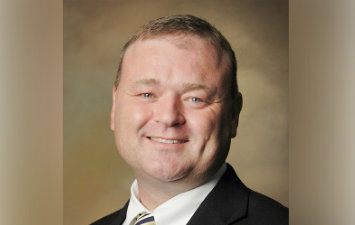MACON – Mercer University professor Dr. Allen Lynch and two collaborators correctly predicted all 36 at-large bids in this year's NCAA Division I men's basketball tournament using their Dance Card statistical model.
Dr. Lynch, who serves as associate professor of economics and quantitative methods in the Eugene W. Stetson School of Business and Economics, along with University of North Florida professor Dr. Jay Coleman and economist Mike DuMond of Charles River Associates, have tracked the results of the model as far back as 1994 and first published its results in 2001.
The trio used the model to correctly predict all at-large bids on one other occasion – in 2013.
“We originally stumbled across a data set online back in 1999 that contained a large amount of performance information about every team that had received a bid or was likely to get a bid in each year going back to 1994. A data set like that is a gold mine to those of us who do predictive analytics,” said Dr. Lynch. “As college basketball fans, we immediately thought that someone ought to use that data to build a formula that could predict future bids – and that someone might as well be us.”
Over the 15-year period from 1994 to 2008, the original Dance Card correctly predicted 476 of 512 at-large bids for a 93-percent success rate. The model missed on more than three selections in only two years – 2007 and 2008.
An updated Dance Card, first used in 2009, included adjustments for historical conference-related biases found in past committee decisions. These biases were reported in a scholarly article, titled “Evidence of Bias in the NCAA Tournament Selection and Seeding,” published in the academic journal Managerial and Decision Economics. They included biases toward major conference teams over mid-majors in both selection and seeding, as well as bias toward teams with some type of committee representation.
An estimate of the Selection Committee's decision criteria, the Dance Card is only as accurate as the committee is consistent. For instance, when historical biases were removed from the updated Dance Card, the model correctly predicted 36 of 37 bids in 2012 and a perfect 37 of 37 bids in 2013. These results suggest that those committees did not follow the biases of past committees, perhaps with some instruction from the NCAA, which acknowledged the Dance Card and questioned the results of the published paper in a 2010 SI.com article and other media reports.
The Dance Card's current iteration, published last year in the Journal of Sports Analytics, has correctly predicted 136 of 144 at-large bids since 2014.
The high level of accuracy and consistency of the model provides strong evidence that the committees, which differ from year to year, are actually quite consistent.
For more information on the Dance Card, visit dancecard.unf.edu.
About the Eugene W. Stetson School of Business and Economics
Established in 1984, Mercer University's Eugene W. Stetson School of Business and Economics is named for Eugene W. Stetson, a 1901 Mercer graduate and business pioneer who leveraged the first major buyout in corporate history. Over the past 80 years, Mercer has granted over 12,000 business degrees, and many of its graduates hold senior leadership positions in companies around the world. Mercer's business school delivers career-focused business education programs and develops entrepreneurial leaders and responsible global citizens. It holds accreditation from the prestigious Association to Advance Collegiate Schools of Business (AACSB), which places it among the top five percent of all top business schools worldwide. Mercer's business school has been recognized by the Princeton Review for “Greatest Opportunity for Minority Students” and “Greatest Opportunity for Women” as well as being one of its “Best Business Schools.” In addition, it has been recognized among the “Top 15 Schools in the Nation for Marketing and Accounting.” The School offers the following programs: Atlanta (Evening BBA, Full-Time (One-Year) MBA, Evening MBA, Executive MBA, Professional MBA, Master of Accountancy, M.S. in Business Analytics), Macon (Traditional BBA and Evening MBA), Douglas County and Henry County (Evening BBA). www.mercer.edu/business










